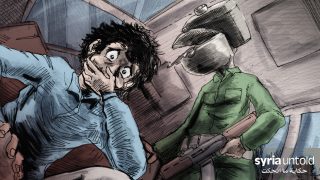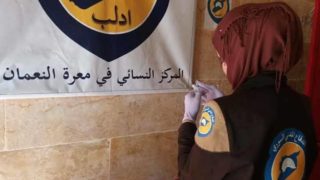This article is part of a SyriaUntold series featuring daily life stories from Damascus.
- Good morning Abu Haitham! Hope that smile never leaves your face!
- Hey, Abu Haitham! Come in for a cup of tea!
- Where to, Abu Haitham? Good morning! Lovely to see you! Any news about the boys?
Abu Haitham (pseudonym, 60) receives dozens of greetings anytime he walks past his neighborhood. With hair dyed pitch black and a beard trimmed twice a day, Abu Haitham has a light and positive presence wherever he goes. His face radiates with a calm and confident smile. His eyes sparkle with intelligence and pragmatism. Abu Haitham is a real estate agent and has more than 20 tenants. In these times, his profession has become a symbol of greed. Real estate agents are perceived as bloodsuckers, feeding on the misery of the displaced, taking advantage of citizens impoverished and humiliated by war. Despite the terrible reputation of this profession, everybody loved and respected Abu Haitham. Tenants readily attest to his good manners and reasonable prices in light of the situation. That sense of humanity makes him stand out from his peers.
Property sales and rentals were not Abu Haitham’s source of income before 2013. He was a jeweler in Tishreen neighborhood of Damascus, close to Barzeh and Qaboun, which became battlegrounds. In late 2012, the fighting parties were targeting the neighborhood with sniper bullets. The security situation deteriorated, and clashes broke out, leading to the death of scores of civilians in the area. In 2013, Abu Haitham decided he could no longer keep the jewelry store, as he sensed a gang of burglars had set eyes on it. That gang even tried to bomb a bicycle in front of the store.
Abu Haitham sold the gold and bought several houses and shops in Rukneddine municipality so that he could to rent them out to families looking for housing or to investors looking for office space. Abu Haitham chose the tenants carefully and preferred people with good reputation and acquaintances over those who could pay more. He was not generous to the extent of offering houses for free to the displaced. His rental fees made him a profit but were far from greedy.
He avoided renting out to soldiers and families whose children were in the army or security institution, out of pragmatism rather than politics as Abu Haitham was loathe to get involved in public affairs. His only concern was securing his two boys and daughter after their mother died. As such, he sought to stay out of trouble and avoid conflict with local thugs or the authorities, picking only tenants he deemed safe.
The laws that were stipulated and amended during the crisis offered many facilitated conditions for families with members serving in the army. For example, the government issued a law forbidding the landlord from evicting tenants if the breadwinner had died while serving the army. The law states that “tenants shall not be evicted if the person paying the rental fees dies, disappears or is detained in military operations and his family continues to occupy the rented property without getting housing from the state. A family shall mean in this case the wife and children, together or separately, throughout the period during which they or any of them are/is entitled to the pension, as well as the people that the original tenant was supporting, be they parents or siblings, together or separately, if they live in the rented property and if the death or disappearance of the tenant is proven by a document issued by the Ministry of Defense.”
Abu Haitham was a target of abduction and extortion gangs that were active in Damascus between 2013 and 2014. He is wealthy and does not hide it. Although he tried to steer clear of danger and trouble, trouble always seems to followed him.
In late 2013, his youngest son Mahmoud (pseudonym, 23) was selling electrical appliances for a living. He was driving his car on Qasioun road, which is mountainous and surrounded by military barracks. It was not late in the evening, and two of his friends were with him. A temporary checkpoint blocked the car’s way. The gang, specialized in abduction as discovered later, confiscated the car, tied up the men, blindfolded them and took their phones away.
The kidnappers contacted Abu Haitham from Mahmoud’s phone and asked for a ransom of $30,000. Then, they went off the radar for what seemed like a decade to Abu Haitham. When they got in touch again, they asked for $50,000. Abu Haitham had a lot to lose, but he knew he was not dealing with regular kidnappers. Most gangs were affiliated with popular committees and security in the region. He had no choice but to obey. At midnight in a deserted area in Qudsaya suburbs, he handed them the amount in exchange for his son and two friends who were all tied up, and the car was never returned.
His eldest son Haitham (pseudonym, 30) was a legal accountant and also faced several abduction attempts. But he had learned to be cautious after his brother’s abduction. He avoided going out at night or walking alone in the deserted streets. He also kept away from areas jammed with security forces and thugs.
Abu Haitham was so worried about his children’s safety that he forgot to look after his own. Early 2014, he was abducted and lost his life and all his belongings.
On a cold February night, he was on his way back home after a long day at work. The power was cut off, and the street was completely empty of moving cars. He parked his car in the neighborhood and headed home. The lights of a parked car were suddenly turned on, and there were men inside waiting for him to step out. He was threatened with weapons and with killing his children. Caving in, Abu Haitham got in the car without shouting for help. They put a black bag on his face and tied his hands and feet with one rope. Then, they led him somewhere on a bumpy road. He spent a whole month in a dark and dirty room without knowing who abducted him or the demanded ransom to free him.
One month and a few days later, the kidnappers threw him out on Saboura road at 5 am. Abu Haitham remained tied up for hours until his eldest son came and carried him to the car, then home. The family was waiting for him—his two sons, his daughter and her husband, and Ferial (pseudonym, 40).
Ferial was not family yet but she would soon become one of them. She was unmarried and worked in a small store she rented from Abu Haitham. The two shared a special relationship that went beyond that of a landlord and tenant. They enjoyed talking about any and every topic. She was fun and had a strange accent. Although she took care of her appearance, she did not want him to consider her a nosy or undignified woman. He was patient when she fell behind rate payments. She always settled her dues in the end.
Ferial lived in what was considered the stronghold of thugs, Bawabat al-Maidan [the gatekeepers of Maidan], and she was certain one of the gangs kidnapped Abu Haitham. The trick was knowing which, and to find the right person to pressure them to keep him alive, with the least damage possible. She risked her life and was threatened because of her numerous questions and search for him. But, she managed to communicate with the kidnappers through a mediator and to reach an agreement on some thousands of dollars to release him. This would not have been possible without the intervention of important families and pressure from the Alawite sect on the kidnappers and threats to hand them over to the authorities.
When Abu Haitham found out about what happened, he asked Ferial to marry him. She accepted. Some of his friends tried to warn him that she might be a collaborator with the kidnappers. But, he trusted his instinct. He was sure Ferial had his best interest at heart and did not let her hear about any of the repeated suspicions to avoid hurting her feelings or offending her.
The abduction was not the end of the real estate agent’s troubles. Abu Haitham also wanted to spare his children the hardships and dangers of conscription in a country at war. He paid huge sums of money to delay the inevitable. He also sought ways to help them leave the country to work in the Gulf. But this proved impossible given the tight restrictions on work and travel permits for Syrians. He researched ways to reach Europe but all the options involved huge risks.
Once, a soldier at a checkpoint stopped one of his sons, whose postponement for conscription would end in two months. The soldier promptly decided to detain the young man at the security branch until the grace period expired and then to drag him to the military service. Extracting his son from that situation cost Abu Haitham 200,000 Syrian Pounds (SYP) [$400], which he paid directly at the checkpoint. After this ordeal, he concluded that Lebanon was the best alternative for his children to live safely. Four years later, he had to pay $8,000 per son so that they could avoid conscription.
These types of experiences, losses and setbacks would break the back of the strongest of men. But Abu Haitham stood his ground with the smile never leaving his face. Each time he suffered financial loss, he found a way to compensate. Abu Haitham was a problem-solver. He was the rock that everybody relied on, financially and morally. This rock would have been broken into a million pieces if Ferial, the love of his life, hadn’t interfered to save him from that cursed abduction that nobody believed he would survive.






